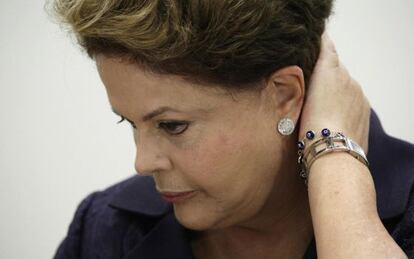Rousseff hopes for revival by announcing new aid package for workers
Brazilian leader looks to gain momentum ahead of October elections by raising flag for development


The May 1 Workers’ Day marked an opportunity for President Dilma Rousseff to address her loyal supporters and potential voters. The day before the celebrations Rousseff announced an aid package for workers on national television and radio networks, a decision that may help strengthen her image at a time when public opinion is going against her.
The aid measures include corrections in the income tax code that guarantee lower contributions, a 10-percent adjustment in the Family Allowance, and a commitment to continue pushing for a higher minimum wage. This last tool changed the economic landscape in Brazil during the Workers’ Party’s years in power as the country’s poorest became richer.
It is an intricate strategy that allows the government to dig into its coffers after promising to reduce the budget this year. With the elections six months away, Rousseff is under heavy pressure. Squeezed by the complaints against Brazilian oil giant Petrobras and stalked by the specter of massive layoffs in the automobile industry, the president is taking the opportunity to highlight the benefits her government and that of her predecessor, Luiz Inácio Lula da Silva, offered Brazilians. She spoke about the 20 million jobs created in the last 11 years and the 70 percent increase in wages over that same period.
“Our government will always defend workers’ rights and their victories,” she said, using the old formula of former president Getulio Vargas – sweet-talking the most underprivileged.
The speech showed that Rousseff is already deep into the electoral fight as her opponents gain strength in the polls
Rousseff also talked about high food prices, linking them to the present economic conditions as well as climate factors. The speech showed that Rousseff is already deep into the electoral fight as her opponents gain strength in the polls. Aécio Neves of the Social Democracy Party rose in a CNT survey last week while Rousseff’s popularity has been increasingly waning.
The president said on two occasions this week that she would continue to defend her candidacy despite the movements clamoring for Lula’s return.
On Friday, Rousseff and Lula will come together at the 14th Workers’ Party National Meeting where they will join forces to re-invigorate the political commitment of their supporters.
President Rousseff's speech also addressed the problems with Petrobras, whose president, Graça Foster, had to return to testify in the Senate on Wednesday. “Petrobras will never be confused with the unbecoming behavior or corrupt acts anyone commits,” she began. “What needs to be purged will be purged with maximum rigor,” she said, adding that she would not remain silent in the face of the negative campaign against the firm by those who “want to exploit it for political gain and won’t hesitate to smear the image of this company that the Brazilian worker built with so much effort, sweat and tears.”
The Workers’ Party is repeating the message that the future can be even better, with more money in your pocket
Rousseff showed her claws but it is impossible to tell whether it will be enough to defend her in the election campaign. At a time when Brazil, the seventh largest economy in the world, seems to be losing the optimism it has inspired in the last few years, according to a World Bank report this week, the Workers’ Party is repeating the message that the future can be even better, with more money in your pocket and with inflation and growth under control.
There is a long road ahead. And, Rousseff is presumably better prepared this year than she was in 2010 when Lula had to do nothing more than say her name for the doors of the presidential palace to blow open before her. Now, though, her adversaries have learned how to attack the weak spots in the Workers’ Party – such as corruption in the administration.
The battle is set for October.
Translation: Dyane Jean François
Tu suscripción se está usando en otro dispositivo
¿Quieres añadir otro usuario a tu suscripción?
Si continúas leyendo en este dispositivo, no se podrá leer en el otro.
FlechaTu suscripción se está usando en otro dispositivo y solo puedes acceder a EL PAÍS desde un dispositivo a la vez.
Si quieres compartir tu cuenta, cambia tu suscripción a la modalidad Premium, así podrás añadir otro usuario. Cada uno accederá con su propia cuenta de email, lo que os permitirá personalizar vuestra experiencia en EL PAÍS.
¿Tienes una suscripción de empresa? Accede aquí para contratar más cuentas.
En el caso de no saber quién está usando tu cuenta, te recomendamos cambiar tu contraseña aquí.
Si decides continuar compartiendo tu cuenta, este mensaje se mostrará en tu dispositivo y en el de la otra persona que está usando tu cuenta de forma indefinida, afectando a tu experiencia de lectura. Puedes consultar aquí los términos y condiciones de la suscripción digital.








































